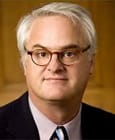Professor Joseph Stiglitz shared the Nobel Prize for Economics in 2001 for his analyses of markets with asymmetric information. He is one of 88 affiliates of the University of Cambridge to have won the Nobel Prize. From 1966 to 1970, he was a Tapp Research Fellow at Gonville and Caius College, Cambridge, and remains an Honorary Fellow of that College. He also holds an MA degree from Cambridge.
This is a tremendous honour. I am grateful to the University of Cambridge Judge Business School for naming its Finance seminar series after me.
The seminars
Where Have All the IPOs Gone?
Professor Jay R Ritter, Joe B Cordell Eminent Scholar, Warrington College of Business Administration, University of Florida
Third Joseph Stiglitz Seminar in Finance, 19 June 2012
in association with the Cambridge Corporate Governance Network (CCGN)

During 1980-2000, an average of 311 companies per year went public in the US. Since the technology bubble burst in 2000, the average has been only 102 initial public offerings (IPOs) per year, with the drop especially precipitous among small firms. Many have blamed the Sarbanes-Oxley Act of 2002 and the 2003 Global Settlement’s effects on analyst coverage for the decline in IPO activity. Professor Ritter and his co-authors offer an alternative explanation, positing that the advantages of selling out to a larger organisation, which can speed a product to market and realise economies of scope, have increased relative to the benefits of operating as an independent firm. Consistent with this hypothesis, they document that small company IPOs have had declining profitability, consistently low returns for public market investors, and an increasing likelihood of being involved in acquisitions.
Visit Professor Ritter’s profile on the Warrington College of Business website
A Shareholder Lawsuit in Fourteenth-Century Toulouse
Professor William Goetzmann, Edwin J Beinecke Professor of Finance, Yale School of Management
Second Joseph Stiglitz Seminar in Finance, 15 June 2011

Professor Goetzmann discussed the feudal foundations of the Toulouse companies and the potential institutional basis for entity-shielding, then traced the development of the governance structure of the Toulouse companies during an important period of institutional transition, focusing on a major legal proceeding in the fourteenth century that highlighted limitations in the governance structure and may have triggered important changes that, to the modern eye, look like the institution of a board of directors. Finally he discussed the political implications of the Toulouse companies, which emerged in the context of a strong urban tradition of governance by council, not unlike contemporaneous Italian city-states, suggesting that the Toulouse companies not only borrowed from earlier feudal precedents, but also were governed by a council-like structure of committee, as opposed to a single executive model.
Visit Professor Goetzmann’s profile on the Yale School of Management website
The US Left Behind: The Rise of IPO Activity around the World
Professor Andrew Karolyi, Professor of Finance & International Business and Alumni Chair in Investment Management, Cornell University
Inaugural Joseph Stiglitz Seminar in Finance, 16 May 2011

During the past 2 decades, there has been a dramatic change in IPO activity around the world. Though vibrant IPO activity, attributed to better institutions and governance, used to be a strength of the US, it no longer is. IPO activity in the US has fallen compared to the rest of the world and US firms go public less than expected based on the economic importance of the US. In the early 1990s, the declining US IPO share was due to the extraordinary growth of IPOs in foreign countries; in the 2000s, however, it is due to higher IPO activity abroad combined with lower IPO activity in the US.
Read the paper on the Social Science Research Network (SSRN) website.
Visit Professor Karolyi’s profile on the Cornell University website


